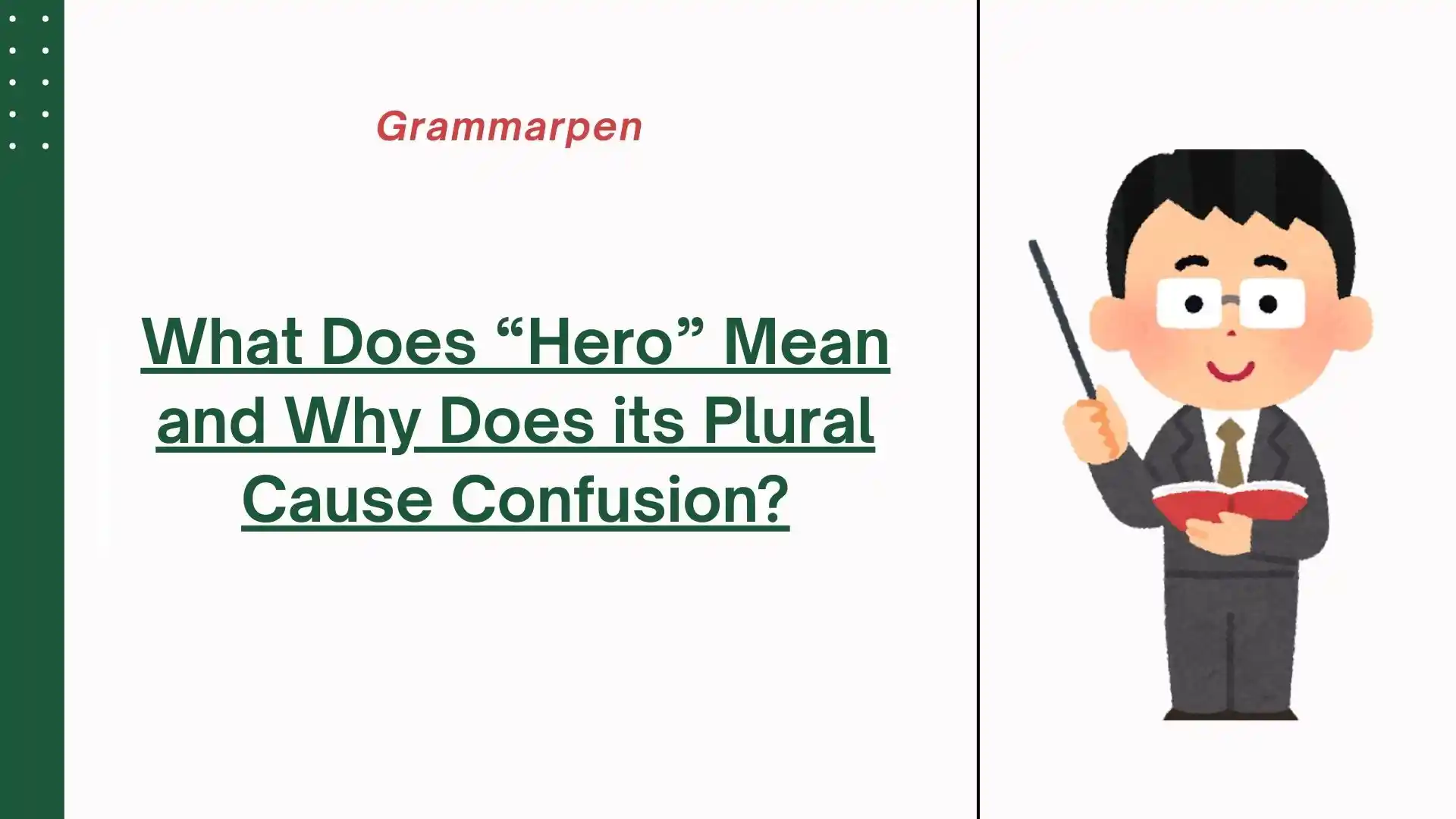What Does “Hero” Mean and Why Does its Plural Cause Confusion?

The word “hero” has been part of English for centuries, describing a person admired for courage, noble qualities, or extraordinary achievements.
From ancient myths to modern news stories, heroes represent the ideal of bravery and selflessness. Yet when it comes to forming the plural, many people hesitate between “heros” and “heroes.” The difference seems small, but in writing, small details shape meaning and credibility.
What is The Correct Plural of “Hero”?
The accepted plural form of “hero” in standard English is heroes. This form follows a common spelling pattern where words ending in a consonant plus the letter “o” add “-es” in the plural.
Similar examples include “potatoes” and “tomatoes.” The extra “e” ensures that the final syllable is pronounced clearly.
This spelling is recognized in dictionaries, grammar guides, and formal writing standards, including university-level English courses.
When is “Heros” Used Instead?
Although “heros” may look like a simplified plural, it is generally considered incorrect when referring to people. There are two exceptions where “heros” is correct.
First, in American English, it can be the plural for a type of large sandwich known as a hero, popular in New York and surrounding areas.
Second, “Heros” is the name of a genus of tropical fish found in South America. In scientific contexts, that capitalized form remains unchanged in the plural.
Why is the Extra “e” Important?
Adding the “e” in “heroes” does more than follow tradition. Studies in linguistic clarity show that predictable spelling patterns help readers recognize words quickly.
When readers see “heroes,” they connect the form to other familiar “-oes” plurals, which improves comprehension and reduces hesitation. A spelling like “heros” for people often triggers a mental pause because it conflicts with learned rules.
Examples that Make the Difference Clear
-
Referring to courageous people: “The firefighters who entered the collapsing building are true heroes.”
-
Referring to sandwiches: “The deli prepared three large heros for the office lunch.”
-
Referring to fish: “The aquarium features two species from the genus Heros.”
-
Referring to fictional characters: “The heroes of the novel face danger and moral tests.”
Each example shows that context decides whether “heroes” or “heros” is correct.
How Do Writers Handle the Plural in Literature and Media?
In storytelling, “heroes” is the natural choice when referring to main characters or people of great courage. News articles, novels, and historical accounts almost always use this form.
Using “heros” in this context can make a piece look unpolished or careless. Editors and style guides recommend sticking with the standard form to maintain credibility.
What do Grammar References and Research say?
Modern dictionaries agree that “heroes” is the correct plural for people. Academic writing guides also confirm that consonant-o endings normally take “-es,” though there are exceptions like “pianos” and “photos” where only “-s” is added.
The Oxford English Dictionary traces “heroes” back to the Latin and Greek roots of the word, showing that the form has been consistent for centuries in English. Linguists point out that while language changes over time, this particular rule remains steady.
How Does Knowing the Correct Plural Help Communication?
Clear communication depends on shared understanding of words and their forms. When you write “heroes” in the right context, you guide the reader toward the intended meaning without distraction.
This is important in professional writing, academic papers, journalism, and any public communication. In creative writing, consistency in plural forms also strengthens the voice of the narrator and avoids jarring the reader.
Related Rules for Other “O” words
Words ending in vowel-o like “radio” or “studio” usually take only “-s” in the plural: “radios” and “studios.” But consonant-o words often take “-es,” though there are exceptions.
“Pianos” and “photos” are common examples where “-s” is correct despite ending in consonant-o. English spelling rules are partly shaped by tradition, so memorizing common forms helps avoid mistakes.
Frequently Asked Questions
Q: Can I use “heros” for people if I prefer simpler spelling?
A: No. While informal writing may bend some rules, “heros” for people will be seen as an error by most readers and editors.
Q: How do I form the possessive of “heroes”?
A: Use “heroes’” for plural possessive, as in “the heroes’ courage inspired the crowd.” For singular possessive, use “hero’s,” as in “the hero’s actions saved lives.”
Q: Are there regional differences in pluralizing “hero”?
A: No major English-speaking region uses “heros” for people as the standard form. “Heroes” is accepted in American, British, Canadian, and Australian English.
Q: Can “heroes” be used for animals?
A: Yes, if the animals are being described metaphorically as courageous. For example, rescue dogs might be called “heroes” in a news story.
Q: How can I remember when to add “-es”?
A: If the word ends in a consonant plus “o” and refers to a person, object, or concept, check a reliable dictionary. Many take “-es,” but exceptions should be learned individually.
Why Getting it Right Builds Trust
Language is one of the first things readers notice when judging credibility. Small errors in spelling, including incorrect plurals, can make a text appear less reliable.
Consistent, correct forms like “heroes” show attention to detail and respect for the reader. This is especially important for educators, journalists, business professionals, and anyone writing for a broad audience.
Visual Guide to Remember The Difference
Imagine three circles. The first shows “heroes” with pictures of brave people, the second shows “heros” with images of sandwiches, and the third shows “Heros” with tropical fish. This mental image can help you choose the correct form without hesitation.
Final Takeaway
The plural of “hero” for people is always “heroes.” Use “heros” only when you are talking about the sandwich or the fish genus.
Keeping this rule in mind will help your writing remain clear, professional, and credible. By mastering such small details, you improve not only grammar but also the trust readers place in your words.
